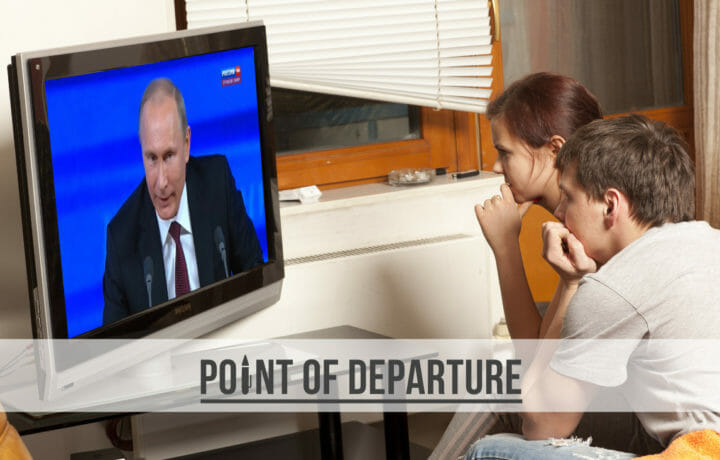“The first casualty when war comes is truth.” — Hiram Johnson
In the lead up to Russia’s invasion of Ukraine, the propaganda campaign began. Weaving a comprehensive and compelling – to some – false narrative, Russian leaders and state-controlled media used both disinformation and focused propaganda across the internet and social media to influence public opinion. The onslaught was purposeful: Russia had to intervene to save Ukraine from itself.
The rhetoric was classic Putin, himself a product of a finely tuned propaganda apparatus. Russia didn’t want a conflict, he insisted, but his hand was being forced. The West was pushing Ukraine toward a conflict, dangling the possibility of NATO membership. There was also concern over planned chemical weapons attacks in the Donbas region, as well as biological weapons plants active in Ukraine. Then there was the Nazi problem. Putin desperately wanted to protect the people of Ukraine from the specter of nationalists, “to bring to trial those who perpetrated numerous bloody crimes against civilians, including against citizens of the Russian Federation.”
Despite massing over 100,000 troops on the border with Ukraine, it was merely a repositioning of forces for training purposes. Until it wasn’t. Then it was an invasion, one with a sole focus of decapitating the ruling and sovereign government.
THE TEN COMMANDMENTS
Propaganda has always been a part of war. In his discussion of the ch’i, or extraordinary force, Sun Tzu emphasized the use of cunning as a means to win without fighting. The indirect strategy involved those actions short of military force – the ordinary force, or ch’eng – that could bring defeat to the enemy. In Samuel Griffith’s 1963 translation of Sun Tzu, it was clear that the ancient master considered propaganda fundamental to the indirect strategy.
In 1928, Arthur Ponsonby, a British politician and the son of Queen Victoria’s Private Secretary, published his book Falsehood in Wartime, opening with the words: “When war is declared, truth is the first casualty” (paraphrasing U.S. Senator Hiram Johnson). In his examination of the role of propaganda in World War I, he regarded false narratives as fundamental to warfare: without lies there would be “no reason and no will for war.” When Belgian historian Anne Morelli systematized Ponsonby’s thinking in her 2001 monograph, Principes Elémentaires de Propagande de Guerre (Basic Principles of War Propaganda), she summarized the techniques described in terms of ten principles, or what has become known as the Ten Commandments of Propaganda.
- We don’t want war, we are only defending ourselves.
- Our adversary is solely responsible for this war.
- Our adversary’s leader is inherently evil and resembles the devil.
- We are defending a noble cause, not our particular interests.
- The enemy is purposefully committing atrocities; if we are making mistakes this happens without intention.
- The enemy makes use of illegal weapons.
- We suffer few losses, the enemy’s losses are considerable.
- Recognized intellectuals and artists support our cause.
- Our cause is sacred.
- Whoever cases doubt on our propaganda helps the enemy and is a traitor.
Those commandments, proven by time, mirror Putin’s own approach in Ukraine, recasting a brutal invasion of a sovereign nation as some kind of humanitarian intervention.
PROPAGANDA IN THE INFORMATION AGE
While Putin’s initial efforts to set the stage for war may have been sufficient to recruit more than a few useful idiots, the effect was short-lived. The voices of those parroting Putin’s propaganda talking points were quickly muted by the on-ground realities in Ukraine. Facebook and Instagram blocked access to Russian state media outlets such as RT and Sputnik. As his attack faltered and losses mounted, he found himself on unfamiliar ground: losing the propaganda war.
Long considered a master of information warfare, Putin’s approach to this conflict was as predictable as a baby boomer descending on an all-you-can-eat buffet at the Golden Corral. He did what he always did. But this wasn’t Chechnya. It wasn’t Syria. It wasn’t even the Crimea. It was 2022, and he was facing a world of content savvy influencers who understood fighting in the modern information domain a lot better than he did. And when the tide of the information war turned on Putin, he found himself looking a lot like an old man wondering how he missed out on the last piece of peach cobbler. The world had passed him by, and he wasn’t quite sure how.
The false narrative that propelled him into Ukraine has now become the subject of wide ridicule. Ongoing attempts to justify the invasion – now mired in its third week of ineptitude – have failed to gain any significant traction. Efforts to twist facts to fit his narrative – for example, claims that medical research laboratories are actually bioweapons facilities – have been countered effectively. Even his denazification propaganda suffered as Task Force Rusich, Russian neo-Nazi mercenaries from the Wagner Group, suggested on Instagram that they might be returning to the fight in Ukraine.
A recent Atlantic Council post summarized Putin’s precarious position: “Faced with the reality of a catastrophic defeat on the information front, Putin has retreated” in a desperate attempt to “protect his grip on domestic Russian audiences.” Not even a staged war rally with forced attendance could turn the tide of the information war. That doesn’t mean that he won’t continue to press the attack in Ukraine, or that the atrocities won’t continue. But what it does mean is that he won’t be fooling anyone with ludicrous claims of innocence. This has become a stark conflict of black-and-white, of good and evil.
The Ten Commandments of Propaganda work both ways, it turns out.




